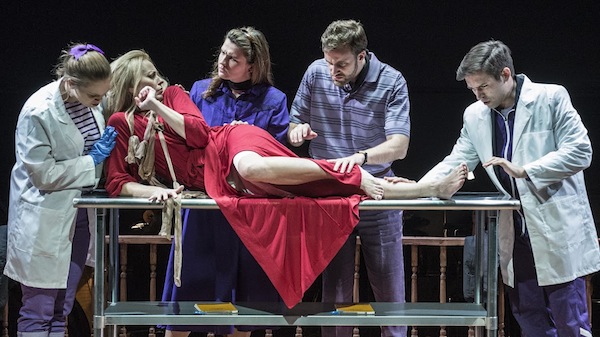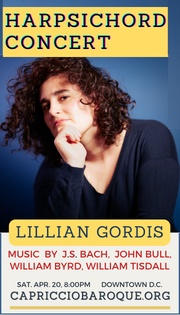Beautiful music and baffling scenario in UrbanArias’ “Florida” premiere

Nancy Allen Lundy with ensemble in the world premiere of Randall Eng’s “Florida” at UrbanArias. Photo: Teresa Castracane
The road to an opera premiere can be long and arduous, as was the case for the new opera presented by UrbanArias on Saturday. Florida, a two-act opera with music by Randall Eng and words by Donna Di Novelli, began as a song cycle and had its first workshop and concert performances over a decade ago. The Atlas Performing Arts Center, it turns out, saw the first complete staged performance of this musically beautiful but dramatically puzzling work.
Eng’s musical vocabulary draws heavily on the world of jazz and Broadway, but with a pleasing variety and depth. He teaches at New York University’s Graduate Musical Theatre Writing Program, where he was also an alumnus.
Florida Fandango is a teenage girl living with her single mother. She falls in love with Marc, a boy across the street, while their neighbors, the Redwoods, sit in moral judgment on their nearby deck like a suburban Greek chorus. Through a series of events, which are not all that clearly explained, Marc kills Florida’s mother and implicates Florida in the crime. Do the neighbors and police assume that Florida is guilty only because she is having sex with a boy?
Florida at times feels like a set of musical numbers uneasily tethered together. Di Novelli’s libretto is verbose and rife with Sondheim-esque, clever wordplay to a fault, wandering into many side alleys without producing a main thoroughfare on which to make the main dramatic journey.
In the title role, Sharin Apostolou focused her light soprano with laser accuracy, turning shrill just at the top end of the role’s range. Her vibrato seemed to work overtime on lower notes as she struggled to make a larger sound. With a career straddling Baroque opera and music theater, however, she was convincing as the teenage girl caught up in the confusing events that led to the murder of her mother.
Tenor Daniel Rowan brought an even more music theater-friendly voice to the role of Marc, the boyfriend who, for reasons not entirely explained, murders Florida’s mother. His slender sound, often covered by the orchestra, turned nasal and pinched at the top. As the mother, veteran soprano Nancy Allen Lundy made the most of the boozy arias Eng wrote for the character, missing only the robust chest voice needed to belt out some of the lower parts.
The most curious aspect of the opera is the Redwood family, Florida’s nosy neighbors, who sit in moral judgment on their nearby deck like a suburban Greek chorus. Ethan Greene, as the family’s clueless father, had the most imposing voice in the cast, a bass-baritone of even power from bottom to top. The mother, mezzo-soprano Hannah Meredith Hagerty, was not quite a match in vocal power, her sound evaporating toward the bottom.
UrbanArias founder Robert Wood conducted the score authoritatively, even with the orchestra placed behind the set. Cameras relayed his gestures to the cast out front through small television screens. While the coordination of orchestra and singers was generally sharp, Wood’s placement was an impediment to proper gauging of sound balances, leading to the orchestra often obscuring the sound of smaller voices like Ian McEuen and Katherine Riddle, who played the Redwood children and a host of other supporting roles.
Members of Inscape Chamber Orchestra produced a consistently polished and clear sound on the instrumental parts. Saxophonist Jonathan Yanik and first violinist Anne Donaldson contributed lovely solos, and the strings together produced a generally warm, blended sound. Percussionist R. Timothy McReynolds handled the score’s broad demands, from suave brush-heavy drum kit to various exotic tinges, including a ruffled piece of paper for the turning of pages in the number “Summer Reading.”
Kevin Newbury directed an economic but effective production. A platform in three pieces served as the Redwood deck, and a window section of Florida’s house was rolled toward center stage at one point (scenic design by Andrew Boyce). Lighting (by Abigail Hoke-Brady) helped differentiate this single scene into the various locations of courtroom, house, and morgue.
Florida runs through April 14 at Atlas Performing Arts Center. urbanarias.org; 202-399-7993 ext. 2.






